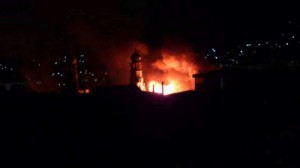Although the feared threat of monsoon has subsided for the moment, many Rohingya are suffering from health problems as an estimated 140,000 people linger in camps, with limited access to medical treatment. According to this report the government is enforcing a separation policy in order to prevent further outbreaks of violence between Burma’s communities – yet the effects of separation are potentially just as devastating for the Rohingya, their lives put in danger by horrendous living conditions.
And the violent unrest continues. Yesterday Buddhists set fire to a school and mosque in Lashio, following an alleged attacked by a Muslim man on a Buddhist woman.
Lashio’s Mosque ablaze
But most chilling is the government’s latest measure to defuse tensions between the two communities. The Rohingya will now be limited to two children per married couple in a reinforcement of a measure first introduced in 1994.
The 800,000 to one million Rohingya in Burma are particularly vulnerable to government abuse because most are denied citizenship under Burma’s discriminatory 1982 citizenship law. Rohingya children born out of wedlock or in a family that already has two children do not receive any status whatsoever from the government, making them ineligible for education and other government services, unable to receive travel permissions, and they are later not permitted to marry or acquire property. They are subject to arbitrary arrest and detention.
Aung San Suu Kyi, who has come in for criticism because of her failure to speak out in support of the Rohingya, has condemned this move.
